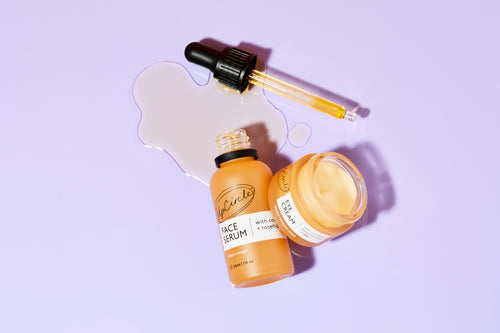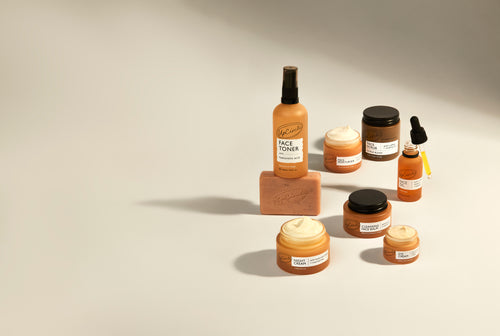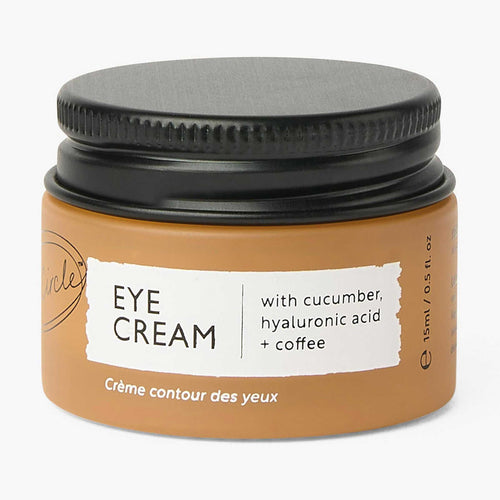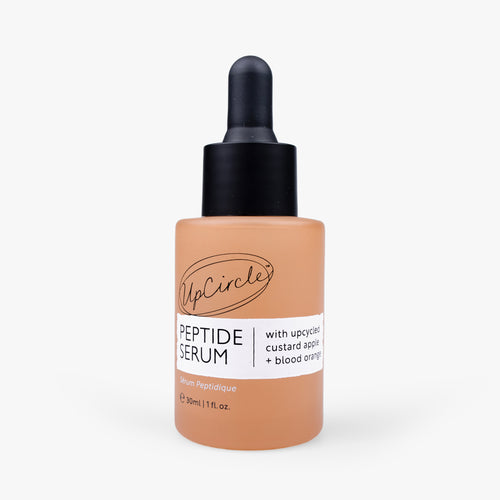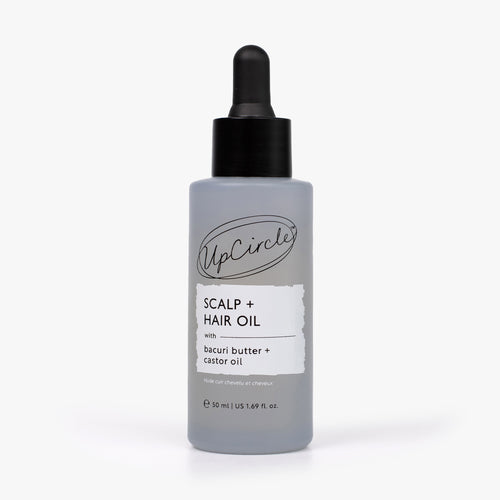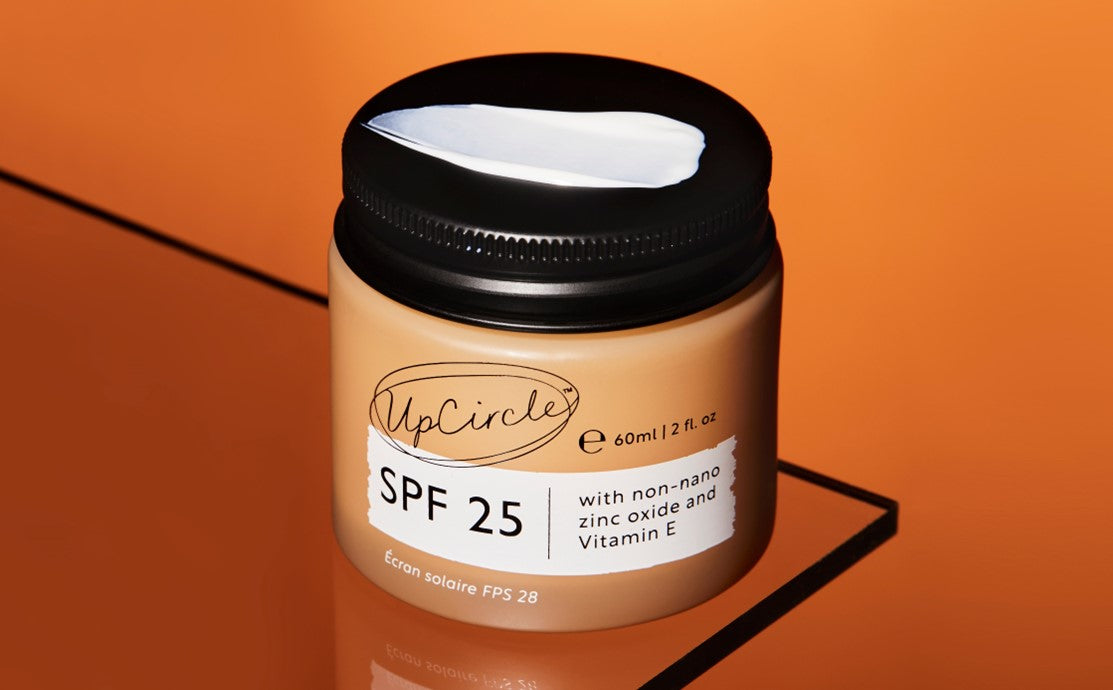Our SPF is here! - Finally. We know our UpCirclers have been patiently waiting for this, and trust us, we have too. We know the importance of having a daily SPF which is natural and great for all skin complexions and skin types which is why we worked so hard on our SPF ensuring it elevates your skin routine, and of course uses a repurposed ingredient! (Upcycled raspberry seed oil).
"We're so excited to finally share our SPF Sunscreen with you. It's been in formulation for over three years and been tweaked more than 20 times to make it nothing short of perfect!" Anna, co founder of UpCircle
SPF is an extremely important and protective step in your skincare routine, and we pride ourselves on creating honest and effective products, so this is no different! Here are common questions asked about our SPF:
How often should you reapply?
We recommend reapplying every 2 hours especially if you are outside and exposed to the sun- this is especially important. Consequences of not reapplying SPF every 2 hours can lead to sunburn which damages the skin cells and blood vessels thus causing the skin to look older, more wrinkled, and drier.
When should you apply?
We recommend applying 30 minutes before venturing outside and should be used as the final step in your skincare routine! This is to allow the sunscreen to bind onto your skin and protect you from UV rays.How much should you apply?
1 teaspoon sized portion of our SPF is the most feasible amount to use on your face and neck where signs of ageing show. We also recommend applying it to your eyelids and lips too, so if you need more, go for it!Does the SPF work on all skin tones?
Yes! We know that mineral SPFs don’t usually work for all skin tones, which is why we didn’t stop until we created an SPF that is suitable for all! Our clever formula glides on skin leaving nothing but a glow. On top of that, we've had our SPF dermatologically tested as well as tested by lots of lucky UpCirclers who tested and provided feedback on our final formulation before we approved it and proceeded with full-scale production. Because if you guys don't like it then what's the point right?!How does the SPF support the skin?
Our SPF 25 sunscreen is packed with skin barrier-supporting ingredients like sunflower oil that’s rich in fatty acids and glycerine helping maintain natural moisture. However, the upcycled raspberry seed oil is the hero ingredient! It’s high in antioxidants Vitamin A and E that boost collagen production for plumper looking skin and shield skin from environmental pollution by protecting against free radical damage.Is the SPF refillable?
Absolutely! We pride ourselves on being an elevated skincare brand that’s better for you AND the planet. Our SPF not only comes in 100% recyclable and plastic-free packaging, but it can also be purchased as part of our refill scheme at 20% off. Good for the world. Good for you. Good for your pockets. What a good idea.
Click this link to refill your existing SPF pot.
How does the SPF help other products?
Skincare is arguably pointless without SPF. Consistently using it alongside other products is the most effective way to help preserve and improve your skin. For example, our pro-retinol night cream and SPF work well hand in hand as the SPF helps activate the qualities of retinol which is to reduce redness and peeling and prevent the skin from the signs of ageing.What is the difference between a mineral SPF and a chemical SPF?
Our SPF is a mineral SPF meaning it is natural, safe for the environment and reflects UV light as opposed to a chemical SPF which absorbs the light. Mineral SPF is much safer for people who are concerned about long-term exposure to chemicals.Why we made an SPF and not an SPF moisturiser?
We have chosen not to add SPF into our moisturiser for several reasons: SPF is too active an ingredient, meaning it can interfere with the original purpose of the moisturiser and therefore should be considered a separate step. SPF needs to be applied regularly throughout the day so if it was included in a moisturiser, you will have to remove any makeup and any other product before reapplying again, which will take too much time! You would also be using a lot of moisturiser which can lead to other skin issues such as blocked pores and over oily skin. Most moisturisers containing SPF will only protect you from UVB but not UVA - it is super important that the product protects you from both!
Can you use the SPF with the moisturiser and oil and if so, which way round?
Absolutely! to get the best protection and glowy skin, we recommend using the following in this order: moisturiser, face oil and then a sunscreen. Using a moisturiser and a oil underneath sunscreen is a triple win! The moisturiser hydrates and nourishes your skin, the face oil with vitamin C brightens your complexion and the sunscreen protects you from any skin damage like sunburn or wrinkles.
Why isn’t your SPF a higher factor?
The myth; “The higher the SPF, the better”, is not true. In fact, there is only a 1% difference between SPF30 and SPF50 (I know, mind-blowing right!). SPF 25 blocks about 96% of sun rays, providing reliable protection. In a nutshell- you don’t need to worry too much about SPF factors and focus on applying and reapplying SPF which is the most effective solution!
Can make-up be applied after the SPF?
100%! It was important to us to ensure our SPF performed well underneath makeup. Our silicone-free formula hydrates and nourishes your skin leaving you nothing but a smooth base to start your makeup. Being silicone-free means the clogging of pores and skin irritation is avoided meaning it is suitable for all skin types like sensitive skin.
How is your SPF “reef safe”?
With ingredients currently being debated as to whether or not they are safe, our approach is to avoid them until more concrete evidence is available. The SPF Mineral ingredients that we use do not contain oxybenzone or octinoxate. These are two common SPF ingredients which are thought to potentially cause coral bleaching. We are 100% ingredient transparent. We avoid raw materials that are considered to be harmful, carry the perception of toxicity or have been linked to any type of skin sensitivity.

